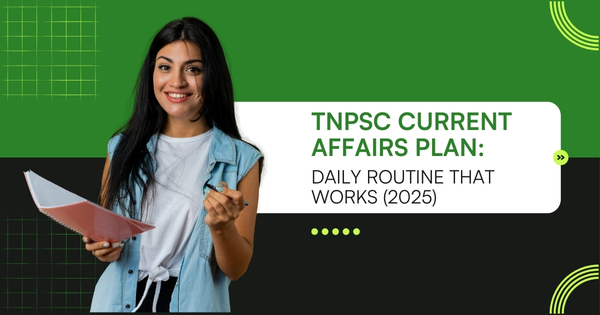Success in TNPSC exam is not just about hard work – this is about smart preparation. In all subjects, an area that wakes up aspirants at night is TNPSC Current Affairs. Unlike history or politics, current affairs change every day, making it difficult to remain continuously. Even aspirants attending TNPSC coaching often struggle with current affairs, not due to lack of guidance, but because they don’t follow a clear daily and weekly routine.
But here is the truth: you do not need to remember every news article. Instead, you need a practical, structured routine that helps you filter important information effectively and update without burnout.
Visit us to gain informataion>>https://www.impacteers.com/home/mentors
In this article, I run you through a step-by-step current affairs preparation plan for 2025 that covers daily, weekly and monthly routines. If you stick to it, you will not only score high in the exam, but will also get confidence to deal with unexpected questions.
Why TNPSC Current Affairs Are So Important
If you’ve seen previous TNPSC papers, you know that 20–30% of the questions come directly from current affairs. And these aren’t random; they are framed in a way that tests your awareness of:
- Government policies & schemes (Union & Tamil Nadu)
- Sports and awards (national and international)
- Science & technology (especially ISRO & DRDO updates)
- International relations (summits, agreements, visits)
- State-specific news (Tamil Nadu schemes, festivals, and policies)
Daily current substance routine
Consistency is the key. This is a daily plan to ensure that you do not miss the most important current affairs for TNPSC.
Step 1: Read in the morning (30-40 minutes)
- Read Hindu, focusing on editorial, national and state news.
- Avoid wasting time on entertainment, crime or gossip news.
- Mark Government Schemes, Economic Update and Tamil Nadu News.
Step 2: Note-construction (15 minutes)
- Maintain a separate current affairs notebook.
- Write in bullet points instead of paragraphs.
Step 3: Quiz Practice (15 Minutes)
- Try a daily current affairs quiz online.
- Quiz not only tests knowledge but also improves speed and memory.
Step 4: Evening recurrence (20 minutes)
- Modify the first day notes from the bed.
- Highlight the latest current affairs 2025 which seems to be examination-worthy.
Weekly Current Affairs Plan
- At the end of each week, spend at least 2–3 hours consolidating what you’ve studied.
- Create a weekly summary sheet with the most important events.
- Discuss with a study partner—teaching others helps you remember better.
- Take a weekly current affairs mock test.
- Mark topics that repeat (like budget updates, awards, sports events).
Example: If India hosted a summit, note down venue, year, theme, and participants.
Monthly Current Affairs Plan
Most coaching centers release monthly current affairs PDFs. While they’re useful, they can be overwhelming if you haven’t prepared daily. Here’s how to use them smartly:
- First, revise your weekly notes.
- Then, skim through the monthly current affairs PDF.
- Highlight only new or missed topics.
- Revise the highlighted ones 2–3 times before the next month.
Latest Current Affairs 2025: What to focus
For TNPSC 2025, here is a priority list:
- Union Budget 2025 and Tamil Nadu State Budget
- New Government Schemes (Central + Tamil Nadu)
- Sports events (Olympic, Asian Games, IPL, etc.)
- Science and Technology (ISRO Mission, Nobel Prize, Medical Search)
- Prizes and appointments
- International Summit (G20, BRICS, UN Event)
- Environment and Climate News

Best Sources for TNPSC Current Affairs
Choosing the right sources saves hours of confusion. Here are the most reliable ones:
- The Hindu Newspaper – National & International
- Dinamani – Tamil Nadu-specific news
- PIB (Press Information Bureau) – Schemes & Policies
- PRS India – Parliamentary updates
- Rajya Sabha & Lok Sabha TV – Debates & Discussions
- Monthly Compilations (PDFs) – Quick revision
Source to grap Oppurtunity >>https://blog.impacteers.com/category/tnpsc/
Smart Tips to Retain Current Affairs
- Use Flowcharts & Mind Maps – Easier than plain notes.
- Follow a 3-2-1 Revision Rule – Revise daily notes after 3 days, 2 weeks, and 1 month.
- Group Study – Discussing current affairs weekly sharpens memory.
- Link with Static Subjects – Example: Read about the Green Hydrogen Mission → Revise environmental science notes.
- Practice with Previous Year Papers – See how TNPSC frames questions.
Preparation plan for current affairs for working aspirations
- Not everyone has 6-8 hours daily. If you are working or managed if you are working or managed with TNPSC Prep
- Morning (20 minutes): Skim newspaper headlines + mark important events.
- Commute/Lunch (15 minutes): Listen to a current affairs podcast or YouTube update.
- Evening (30 minutes): Modify daily notes + Efforts 10-15 Quiz Question.
- Weekend: Spend 2-3 hours on weekly amendments.
Conclusion
Preparation of TNPSC Current Affairs 2025 does not mean that drowning in newspapers and PDF. With a clear daily, weekly and monthly plan, you can be consistent without stress.
Note daily current matters today, modify the weekly current affairs with summary, and strengthen your knowledge with monthly current affairs PDF. Mix it with quiz and smart note-making, and you will be the exam.
Remember: It’s not about studying more, it is about studying smart. Stick to this scheme, and the current affairs section in TNPSC exam will become your strongest weapon.
Learn More >>> https://blog.impacteers.com
About US >>> https://www.impacteers.com
FAQs on TNPSC Current Affairs
Q1. How many months of current affairs should I study for TNPSC?
At least 12 months before the exam. For safer preparation, cover 18 months.
Q2. Are monthly current affairs PDFs enough?
No. Use them only for revision, not as your primary source.
Q3. Which is better for TNPSC—daily or weekly current affairs?
Daily preparation + weekly revision works best.
Q4. How do I balance current affairs with other TNPSC subjects?
Spend 1 hour daily on current affairs, and use the rest for core subjects.
Q5. Should I study Tamil Nadu current affairs separately?
Yes. State-specific current affairs are highly important.




Post Comment